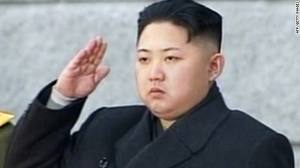North Korean leader Kim Jong-Un on Wednesday hailed the recent execution of his powerful uncle Jang Song-Thaek, saying the removal of "factionalist scum" had helped cement unity among his people.

Kim, in his New Year message broadcast on state TV, described the purge of a "faction" within the ruling party as a "resolute action", in his first public remarks about Jang since his shock execution on December 12.
"Our party took a resolute action to remove... factionalist scums within the party last year," Kim said, repeating the party's earlier accusation against Jang that he tried to build his own powerbase.
"Our party's timely, accurate decision to purge the anti-party, anti-revolutionary and factionalist elements helped greatly cement unity of the party and the revolution and strengthened our solidarity by 100 times," he said.
Yang Moo-Jin, a professor at Seoul's University of North Korean Studies, said the speech underlined Kim's intention to portray himself as an unchallenged and stable leader, two years after he took the reins of power.
"He is giving a message to its people that, with Jang gone, now let's put the purge behind and look to the future based on firm unity among the party, military and the government," Yang said.

Jang Song Thaek, North Korean leader Kim Jong-un's uncle
Jang, once the communist country's unofficial number two and Kim's political mentor, was executed on a range of charges including plotting a coup and corruption.
The 67-year-old played a key role in cementing the leadership of the inexperienced Kim, who took power after the death of his father and long-time ruler, Kim Jong-Il, in December 2011.
But Jang's growing political power and influence drew resentment from his nephew barely half of his age, analysts said.
Jang's purge also stemmed from political battles among Pyongyang officials to control the mineral-rich country's lucrative coal trade business once dominated by Jang, Seoul's spy chief said last week.
The purge was staged in an extraordinarily public and brutal fashion, while Jang was criticised in a party statement as "human scum" and a drug-addicted womaniser who pocketed millions of dollars of state money to support his decadent lifestyle.
Kim Jong-Un stressed on Wednesday that the latest purge was proof that the ruling communist party was dedicated to serving the public.
He also called for more efforts to boost the country's crumbling economy by developing its infrastructure, energy and farming sectors.
"This year we should keep up agriculture as a major thrust of our effort in the struggle for economic construction and improving the people's standard of living, and concentrate all our efforts on farming.
"The electric-power and coal-mining industries and the rail transport sector should make coordinated innovations... (giving) strong impetus to the development of the national economy," he said.
Jang's execution -- the biggest political upheaval since Jong-Un took power -- raised questions over potential instability within the impoverished but nuclear-armed state.
Seoul's defence chief and analysts said the isolated state could stage military provocations early this year to divert public attention and rally domestic unity.
Kim Jong-Un stepped up hostile rhetoric in Wednesday's speech, saying that the Korean peninsula would be engulfed by "massive nuclear disaster" if war breaks out there again. He also warned that the US would not be safe in the event of a conflict.
"If the war breaks out again in this land, it will bring about a massive nuclear disaster and the US will also never be safe," Kim said.
"We are faced with a dangerous situation in which a small, accidental military clash can lead to an all-out war," he said.
Kim added he would not beg for peace and vowed to protect the North with strong self-defence measures against enemies.
The leader however took a slightly conciliatory posture towards the South, saying now was "high time" to ease tension between the two Koreas.
"A favourable climate should be established for improved relations between the North and the South," he said, urging Seoul to stop what he called "slander" against Pyongyang.
Cross-border ties have been icy for years after Seoul accused Pyongyang of torpedoing its warship in March 2010 with the loss of 46 lives. The North angrily denied the charge but went on to shell a border island in November the same year, leaving four South Koreans dead.
The North also closed a joint economic zone with the South north of the border last April, citing perceived hostility by the South and its ally the US. The Kaesong industrial complex reopened five months later after months of negotiations.
AFP
Tags
Your Comment